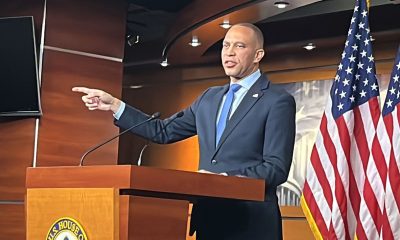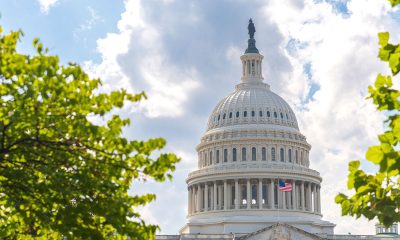Op-Ed
Republicans Use Cruelty as a Political Weapon
By Lee A. Daniels
NNPA Columnist
Donald Trump, the blowhard mogul masquerading as presidential candidate, has once again discovered the problem with trying to be a demagogue in a democracy: It’s the risk of “going too far.”
Sometimes that means merely being made to look foolish – as when President Obama early in the 2012 presidential election season deftly punctured Trump’s trying to play the conservatives’ racist “Birther” game.
However, at other times it means being exposed as a vindictive bully whose fragile ego provokes a reflexive lashing out at any and all critics. That’s the muddy road Trump’s been splashing down since he punctuated announcing his candidacy last month with a vile slur against undocumented Mexican immigrants, Hispanic-Americans and citizens of Mexico alike, and followed it this month by attacking in personal terms two GOP veteran Senators, John McCain, of Arizona, and Lindsey Graham, of South Carolina, who had sharply criticized his antics.
Trump’s astonishing behavior – in declaring that McCain, who endured years of brutality in a North Vietnamese prison during the 1960s’ war in Southeast Asia, was “not a war hero,” and then days later publicly revealing Graham’s mobile phone number and urging his supporters to call him – wasn’t just “unpresidential.” It wasn’t even “adult.” Nor was it smart politically – one reason being his juvenile antics revived questions about the five deferments he got to avoid military service during the Vietnam War years. (Graham also is a military veteran.)
Moreover, Republican officials couldn’t have been happy that numerous analysts quickly noted the strong whiff of hypocrisy pervading their outrage at Trump’s insulting McCain – given the concerted “not-a-war-hero” “swift-boating” campaign the GOP launched against John Kerry during the Massachusetts Democrat’s 2004 presidential run.
But Trump’s bully-boy behavior also revealed something far more worrisome than just his boundless ego and inability to counter in a sophisticated fashion the criticism, whether warranted or not, any presidential contender gets. That is that it perfectly reflects what’s become the foundation of Republican Party politics at the local, state and national levels: the use of cruelty as a political weapon.
Consider some of the landmarks of Republican Party politics during the Obama years:
From shutdowns of the federal government that deprived government workers of wages and citizens of needed services; to the imposition of unnecessary and draconian rules on economically-distressed citizens needing food stamps and other forms of government assistance; to a continuing pathological obsession with controlling women that’s only partially obscured by sanctimonious anti-abortion rhetoric; to their denigration of public–sector workers and their unions, the GOP’s domestic program has grounded itself in stoking a cruelty-over-compassion attitude about government’s relationship toward those not included in its “tent” of “Real Americans.”
Of course, the use of cruelty as a political weapon has been the GOP’s stock-in-trade since the late1960s when President Richard Nixon replaced the overtly racist lexicon of the defeated Southern segregationist wing of the Democratic Party with a Southern Strategy based on racially- coded appeals to Whites. In the 1980s the Reagan political machine re-christened that approach as “wedge politics” and used it to over time largely erase any allegiance within the Party to responsible bipartisan cooperation with Democrats. Instead, they stoked in its increasingly Whites-only base the demand for a rigid adherence to reactionary politics that Obama’s electoral and policy successes have intensified even more.
Ironically, the GOP’s surrender to extremist politics quickly provoked an ongoing internal power struggle between its establishment politicos and insurgents that has resulted in a string of successful and unsuccessful primary challenges to several GOP Senators and Representatives the radical right deemed not conservative – that is, cruel – enough. Those challenges, which taken together have no parallel within the Democratic Party, underscore the fierce authoritarian attitudes of the GOP Base – its need to feel it’s dominating others. No one currently better expresses that mentality than Trump.
One might be tempted to just enjoy the disruption Trump has brought to the GOP’s presidential primary doorstep for the second consecutive time. Except it suggests the continuation of a particularly egregious reality:
Just when the economic and social viability of much of “the 99 percent” of ordinary Americans – from the very poor to a significant portion of those who earn middle-income wages – threatened by the combination of numerous technological developments and global economic forces, one of the nation’s two major parties remains committed to cruelty as a foundation for governing.
Lee A. Daniels is a longtime journalist based in New York City. His essay, “Martin Luther King, Jr.: The Great Provocateur,” appears in Africa’s Peacemakers: Nobel Peace Laureates of African Descent (2014), published by Zed Books. His new collection of columns, Race Forward: Facing America’s Racial Divide in 2014, is available at www.amazon.com.
###
Alameda County
Seth Curry Makes Impressive Debut with the Golden State Warriors
Seth looked comfortable in his new uniform, seamlessly fitting into the Warriors’ offensive and defensive system. He finished the night with an impressive 14 points, becoming one of the team’s top scorers for the game. Seth’s points came in a variety of ways – floaters, spot-up three-pointers, mid-range jumpers, and a handful of aggressive drives that kept the Oklahoma City Thunder defense on its heels.

By Y’Anad Burrell
Tuesday night was anything but ordinary for fans in San Francisco as Seth Curry made his highly anticipated debut as a new member of the Golden State Warriors. Seth didn’t disappoint, delivering a performance that not only showcased his scoring ability but also demonstrated his added value to the team.
At 35, the 12-year NBA veteran on Monday signed a contract to play with the Warriors for the rest of the season.
Seth looked comfortable in his new uniform, seamlessly fitting into the Warriors’ offensive and defensive system. He finished the night with an impressive 14 points, becoming one of the team’s top scorers for the game. Seth’s points came in a variety of ways – floaters, spot-up three-pointers, mid-range jumpers, and a handful of aggressive drives that kept the Oklahoma City Thunder defense on its heels.
One of the most memorable moments of the evening came before Seth even scored his first points. As he checked into the game, the Chase Center erupted into applause, with fans rising to their feet to give the newest Warrior a standing ovation.
The crowd’s reaction was a testament not only to Seth’s reputation as a sharpshooter but also to the excitement he brings to the Warriors. It was clear that fans quickly embraced Seth as one of their own, eager to see what he could bring to the team’s championship aspirations.
Warriors’ superstar Steph Curry – Seth’s brother – did not play due to an injury. One could only imagine what it would be like if the Curry brothers were on the court together. Magic in the making.
Seth’s debut proved to be a turning point for the Warriors. Not only did he contribute on the scoreboard, but he also brought a sense of confidence and composure to the floor.
While their loss last night, OKC 124 – GSW 112, Seth’s impact was a game-changer and there’s more yet to come. Beyond statistics, it was clear that Seth’s presence elevated the team’s performance, giving the Warriors a new force as they look to make a deep playoff run.
Activism
Essay: Intentional Self Care and Community Connections Can Improve Our Wellbeing
At the deepest and also most expansive level of reality, we are all part of the same being, our bodies made from the minerals of the earth, our spirits infused by the spiritual breath that animates the universe. Willingness to move more deeply into fear and pain is the first step toward moving into a larger consciousness. Willingness to move beyond the delusion of our separateness can show us new ways of working and living together.

By Dr. Lorraine Bonner, Special to California Black Media Partners
I went to a medical school that was steeped in the principles of classical Western medicine. However, I also learned mindfulness meditation during that time, which opened me to the multifaceted relationship between illnesses and the interconnecting environmental, mental and emotional realities that can impact an individual’s health.
Therefore, when I began to practice medicine, I also pursued training in hypnosis, relaxation techniques, meditation, and guided imagery, to bring a mind-body focus to my work in medical care and prevention.
The people I saw in my practice had a mix of problems, including high blood pressure, diabetes, and a variety of pain issues. I taught almost everyone relaxation breathing and made some general relaxation tapes. To anyone willing, I offered guided imagery.
“My work embraced an approach to wellness I call “Liberatory Health” — one that not only addresses the treatment and management of disease symptoms but also seeks to dismantle the conditions that make people sick in the first place.”
From my perspective, illness is only the outermost manifestation of our efforts to cope, often fueled by addictions such as sugar, tobacco, or alcohol, shackled by an individualistic cult belief that we have only ourselves to blame for our suffering.
At the deepest and also most expansive level of reality, we are all part of the same being, our bodies made from the minerals of the earth, our spirits infused by the spiritual breath that animates the universe. Willingness to move more deeply into fear and pain is the first step toward moving into a larger consciousness. Willingness to move beyond the delusion of our separateness can show us new ways of working and living together.
To put these ideas into practical form, I would quote the immortal Mr. Rogers: “Find the helpers.” There are already people in every community working for liberation. Some of them are running for office, others are giving food to those who need it. Some are volunteering in schools, libraries or hospitals. Some are studying liberation movements, or are working in urban or community gardens, or learning to practice restorative and transformative justice, or creating liberation art, music, dance, theater or writing. Some are mentoring high schoolers or apprenticing young people in a trade. There are many places where compassionate humans are finding other humans and working together for a better world.
A more compassionate world is possible, one in which we will all enjoy better health. Creating it will make us healthier, too.
In community, we are strong. Recognizing denial and overcoming the fragmenting effects of spiritual disorder offer us a path to liberation and true health.
Good health and well-being are the collective rights of all people!
About the Author
Dr. Lorraine Bonner is a retired physician. She is also a sculptor who works in clay, exploring issues of trust, trustworthiness and exploitation, as well as visions of a better world.
Activism
Opinion: Can Donald Trump Pole Dance?
Given all that is happening, if the presidency was more like pole dancing, you know Trump would be flat on his butt.

By Emil Guillermo
The news cycle has been buzzing the last few weeks. Xi, with Putin and Kim, the sweethearts of Trump carousing alone without him? The victims of the pedophile Epstein speaking out publicly in DC.
Then, there’s the release of that salacious letter Donald Trump allegedly wrote to Jeffrey Epstein. Trump said the letter didn’t exist. But it does.
Timing is everything.
Additionally, there are further concerns, such as the Supreme Court removing restrictions on ICE interactions. ICE Agents can stop anyone now. For any reason. And there’s the threat of the U.S. sending the military to fight crime in Chicago. Trump even posted a meme of himself as a character in “Apocalypse Now.”
All that with bad polls and bad economic numbers, and these topics are dominating the news cycle — Trump era chaos.
Given all that is happening, if the presidency was more like pole dancing, you know Trump would be flat on his butt.
The reality is the opposite. He keeps going strong like nothing’s happened. Inexplicably, Trump always seems to defy gravity.
That’s why to reassure myself with reality, I just think of Trump on a pole. Dancing. He was born on Flag Day, after all.
I’ve got pole dancing on my mind because I’m in Canada at the Vancouver Fringe Festival doing my show, “Emil Amok 69, Everything’s Flipped,” about how the current political situation gets very personal.
Get tickets here if you’re near:
I’ve performed at 16 fringe festivals, and I always look for unique performers. This year, in my same venue (the Revue Stage) I found her in a show, “The Pole Shebang.”
Andrea James Lui may look like a typical Asian American at first.
But she’s Asian Canadian, married to an Australian, who now lives down under.
At the Vancouver Fringe, she highlights her special identity.
Pole Dancer
Yes, pole dancing has come to the fringe. Leave your dollar bills at home, this is not that kind of pole dancing.
This is more Cirque Du Soleil-ish- acrobatic stuff, yet it’s hard to deny the sexiness when a woman flawlessly swings from a pole with her legs apart.
The show is more intriguing than it is titillating.
Lui has created a behind-the-scenes look at the “polar” experience.
“She could have been a physicist,” says her big sister Christina, who despite saying that, supports her sister 100 percent.
Lui touches on some of the emotional depth in the poled subculture. But there’s plenty more to mine in the future. “Polar Bare,” the Musical? I’d see it.
Trump on a Pole
So that’s how I’ve come to the polar metaphor.
As Trump flails in the news, I picture him on a pole.
The letter to Epstein is further proof of the character of the man.
Will he stay afloat?
Not if the presidency were more like pole dancing.
You can’t lie on the pole.
That’s one way all of us in the Trump era can get to the truth.
About the Author
Emil Amok is a veteran journalist, commentator, and stage monologist. He has written a weekly column on Asian Americans for more than 30 years.
Contact: www.amok.com
-

 Activism3 weeks ago
Activism3 weeks agoOakland Post: Week of November 12 – 18, 2025
-

 Activism3 weeks ago
Activism3 weeks agoIN MEMORIAM: William ‘Bill’ Patterson, 94
-

 Activism3 weeks ago
Activism3 weeks agoHow Charles R. Drew University Navigated More Than $20 Million in Fed Cuts – Still Prioritizing Students and Community Health
-

 Bay Area3 weeks ago
Bay Area3 weeks agoNo Justice in the Justice System
-

 #NNPA BlackPress3 weeks ago
#NNPA BlackPress3 weeks agoLewis Hamilton set to start LAST in Saturday Night’s Las Vegas Grand Prix
-

 #NNPA BlackPress2 weeks ago
#NNPA BlackPress2 weeks agoBeyoncé and Jay-Z make rare public appearance with Lewis Hamilton at Las Vegas Grand Prix
-

 Activism2 weeks ago
Activism2 weeks agoOakland Post: Week of November 19 – 25, 2025
-

 #NNPA BlackPress3 weeks ago
#NNPA BlackPress3 weeks agoThe Perfumed Hand of Hypocrisy: Trump Hosted Former Terror Suspect While America Condemns a Muslim Mayor





























































